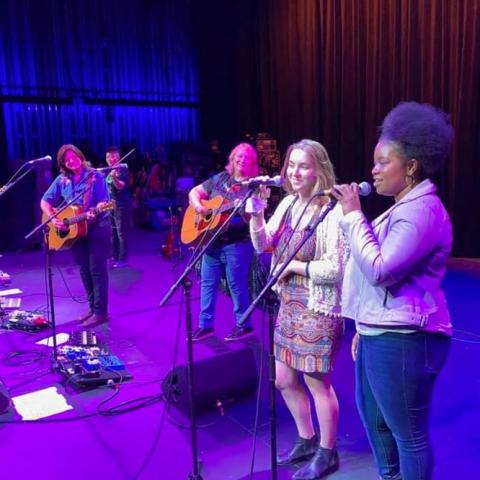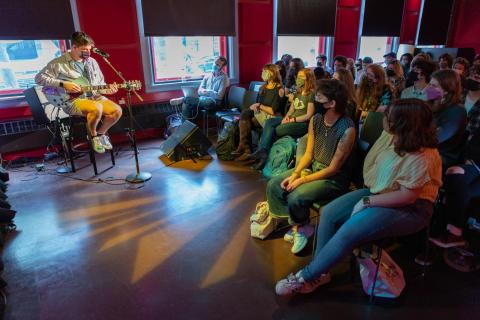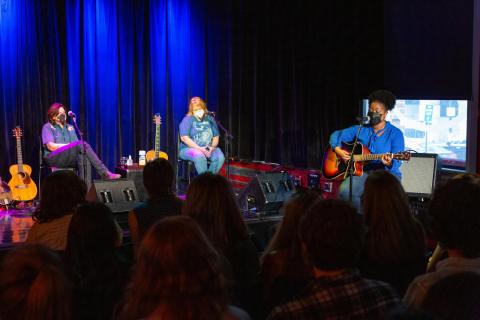Indigo Girls Share Advice and the Stage with Berklee Singer-Songwriters

Left to right: Emily Saliers of the Indigo Girls; Berklee students Cammi McDermott, Leana Nykole, and Oscar Hall; Amy Ray of the Indigo Girls; and Janie Barnett, Berklee associate professor of voice
Image by Mike Spencer
It’s not every songwriting class that offers students the chance to workshop an original tune with a Grammy-winning folk duo, leading to an invitation to join the act on stage to sing its definitive hit in front of an adoring, sold-out crowd. But that’s what happened when Emily Saliers and Amy Ray of the Indigo Girls were on campus for a recent master class.
“Y’all have a high standard here...everyone’s so good,” said Ray, to cheers and laughs from the audience, after music therapy major Oscar Hall, one of three students selected to take part in the workshop, performed an aching ballad titled “If It All Meant Nothing.” Hall followed Cammi McDermott, a double major in songwriting and music therapy, who played the Julian Baker–inspired “Bad Habit,” praised by Saliers as a “beautiful journey of a song.” Leana Nykole, a professional music major, rounded out the workshop with a soulful original, “Van Gogh,” earning props from Saliers for her “knockout” voice.
Record it a million different ways, let it resonate, and see which way resonates with you.
—Amy Ray, Indigo Girls
Throughout the 90-minute master class, held at the Red Room at Cafe 939, Saliers and Ray provided the students with a range of constructive feedback, from the importance of space (Saliers: “It makes a song feel less long if you give it a breath so the listener has a moment to think about what you just said.”) to the value of experimenting with song structures and arrangements (Ray: “Record it a million different ways, let it resonate, and see which way resonates with you.”). The Indigo Girls also treated the crowd to a couple of their own songs, performing “Muster,” a commentary on American gun culture, and “Look Long,” the title track of their latest full-length.

Leana Nykole (right) and Cammi McDermott sing "Closer to Fine” with the Indigo Girls.
After the master class, Saliers and Ray invited the three students to join them the following night on stage to perform “Closer to Fine,” the Indigo Girls’ signature song, at the finale of their concert at the Umbrella Arts Center in Concord, Massachusetts. Hall wasn’t available to attend, but McDermott and Nykole were quick to accept the offer.
“The experience was unreal, and so incredible,” said Nykole. “I think what made it so great is the fact that after a year of being shut down from live music and concerts, I am finally able to perform again.”
Though “Closer to Fine” was released in 1989, years before McDermott and Nykole were born, both students grew up listening to the Indigo Girls—a testament to the band’s cross-generational appeal.
“I don't think my music would exist or be quite the same without them, both in regards to style, as well as in being able to write songs about openly being an LGBTQ+ human being,” said McDermott. "To actually go on stage and sing one of my favorite songs with them was such a privilege."

Student Oscar Hall plays “If It All Meant Nothing" at Cafe 939.
In addition to the workshop, the master class included an interview and Q&A session moderated by Janie Barnett, an associate professor in the Voice Department. Here’s an edited version of the conversation:
How do you find your authentic voice as a singer, writer, and performer?
Saliers: I don’t even know if I’ve found mine yet, to be honest with you. Early on I was a massive Joni Mitchell fan. I wanted to write like her, I got her songbook, and I learned all of her songs by heart. She was the pinnacle of songwriting for me at that time, and it was almost debilitating because I knew that I would never be that. But after a while, especially in my later years, I started to realize that each songwriter is different—and we saw that today, with three equally great songs each completely different from the other—and I started to realize and value the validity of my own voice, even if I couldn’t write like Joni Mitchell. But that took a long time [because] I also wanted to write like Earth, Wind & Fire and like Stevie Wonder and that was impossible for me. So I think that what I was trying to stop doing was completely emulating a style, and I just kept fumbling through my own style. But I really feel like I’m coming into my own voice at this part of my life [and] I’m a better songwriter now than I was all that time ago. I also think that...your attitude, your perspective on things can shift...and it’s OK to have a voice at this one point in your life and to have it shift to something else in another part of your life. But...the most important thing is to try not to copy or write like someone else—that freed me on my journey to finding my voice.
Ray: A voice teacher told me a long time ago that you should sing like you talk. That’s your personality [and] when someone hears your voice it should not be a surprise to them…. There are some people and you look at them and they’re little and this voice comes out of them and it’s huge. And there are great singers with very affect-oriented voices, like Joe Cocker, but you can hear the meat of their own personality in that voice. That really helped me because I had such a low voice, and a lot of the singers I was listening to were either guys or women with really high voices...so I said, well, I’m just going to sing like I talk. And I think the more you write, the more you will find yourself...because you’ll always emulate at first, and Emily and I still do it...like, we’re big Justin Vernon fans but we’ll probably not make a Bon Iver record unless he does it for us. But you can still love so much and get inspired [by others] and get ideas that are not emulating them but are helping you as a singer, songwriter, producer, or performer.
How do you make time for your creative process?
Saliers: It’s a matter of finding balance, but I think it also depends on what part of your journey you’re on. For me there was a time when I was much more consumed with writing and thinking about where our career was...but I do less of that now that I have kids and a wife and a life at home, and it’s become just as important for me to nurture that relationship with my family [as] it is to focus on music. So it really depends on where you are in your life, but I would say that if you’re making yourself sick, you should go have dinner with your friends, because if you’re sleepless, if you’re obsessed with what you’re working on to the point where it’s distressing you, I think you just take your own temperature. And just as a basic rule of thumb I always feel it’s good to step away from whatever you’re completely immersed in and get some perspective from another part of life, like a good friend or dinner out or a movie or a trip or anything like that.
Ray: I used to have a very lax process—beer on the front porch, will the muse hit me?—and that wasn’t working. I wasn’t getting any better, so I learned the discipline of writing music around 20 years ago [and] it totally upped my game, because Emily was so much further along than me and we’re partners, I just felt like, I gotta change this. So I read a bunch of books but the most influential one was Stephen King’s On Writing, and he’s just talking about every day sitting down and having a certain amount of time to write. It doesn’t have to be five hours—it shouldn’t be five hours, to be honest with you. If you spend an hour writing every day you’d be surprised what you can get done… Just don’t not do it.

Student Leana Nykole plays "Van Gogh" for the Indigo Girls at Cafe 939.
How do you balance mental health with the demands of a music career?
Ray: It’s important to be in a good space mentally. I always say at least have some space reserved for [mental health] every day, whatever it is for you that makes that happen. It could be that writing a song makes you feel better, or practicing, but it is a balance, so I do try to make sure I don’t spend too much time on one thing…. With whatever I’m doing, I just try to be in the moment and in the now [and] if I can’t do that, I question if I should be doing that thing.
Saliers: I think you also have to be in tune with whether you’re anxiously reaching out to make connections, or anxiously trying to make the most of your time. You’ll feel that emotionally...it’s like the synthesis of a relationship—say you meet someone on campus and you have camaraderie and you decide to cowrite together or start a business together...you will feel in your spirit that this is not an anxious pursuit but something that’s a heart pursuit that feels really good—like, Amy and I had, since high school, an immediate heart connection and pursuit, and now here we are 40 years later…. [And] for instance, Clay Cook [’98], who plays with Zac Brown now, and John Mayer [’96]—y’all know who he is, right?—they were just friends and they cowrote some songs together, and now I’ve done a couple solo things with Clay and he always talks about his days [at Berklee] with John, and they never knew what was going to happen in their future—they just clicked. So I would spend my time soaking up the things that click and keeping a mind for what is anxious pursuit...and you’ll find your priorities.
What advice do you have for women entering the music industry?
Saliers: First, I’ll say that at the heart of everything is sexism…. There was this one time that New York Times Magazine was going to do this article about us—I dunno, lesbians with acoustic guitars, or women with acoustic guitars—and they just ended up pigeonholeing us, and I often think about, like, Bruce Springsteen is a great, great artist, and there are many men who are great artists and they’re writing about things from the heart. But women...if they write from the heart, then it’s like ‘that’s just women with acoustic guitars’...it’s OK for men to write and do certain things and it’s never gonna be OK for women to do it in the same way. That’s because of the uneven power, so that’s always bothered me, and it still bothers me.... But you find the people to be together with, to lift your joy with, through music or through conversation...and you support each other and keep fighting the good fight.
Ray: It’s an ecosystem, and when we were coming up, the thing that helped us get where we are was by not competing. You don’t compete with each other; you build your ecosystem. The system is set up, and it was when we started as well, to make you compete against each other...and women get left behind. You have to stick with each other and lift each other up, because you will succeed more if you do that, I promise you. It doesn’t have to be all women sticking together, I’m just talking about allies sticking together that believe in equity…. And get as much knowledge about how the industry works, because knowledge is total power, and it’s the only reason Emily and I were able to skirt through it...we could run our own sound system, we knew if they were ripping us off at the door, so we weren’t anybody’s fool, basically. And if you can’t be part of somebody’s structure or framework—woman, man, whatever you are—create your own with a bunch of people who are like-minded.
How do you decide who takes the lead on a song?
Saliers: Whoever writes the song typically sings the lead part…. The other thing is sometimes we’re arranging a song and we might decide that one of us will take the lead melody in a certain part of the song, or a verse, and we might do that because there’s something that strikes us about changing it up that feels good musically.
How much of your songwriting process is theory-based vs. feel-based?
Saliers: None of the first and all of the second…. It’s all about how the music fits with the lyrics.



